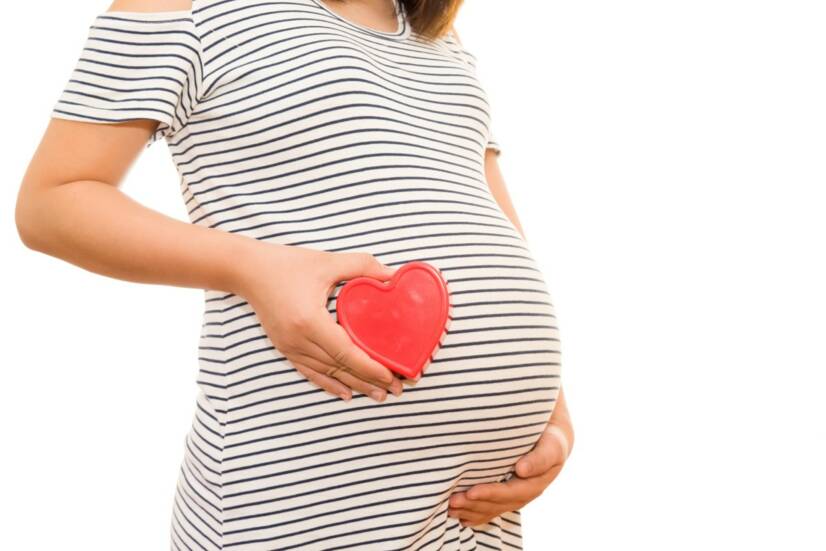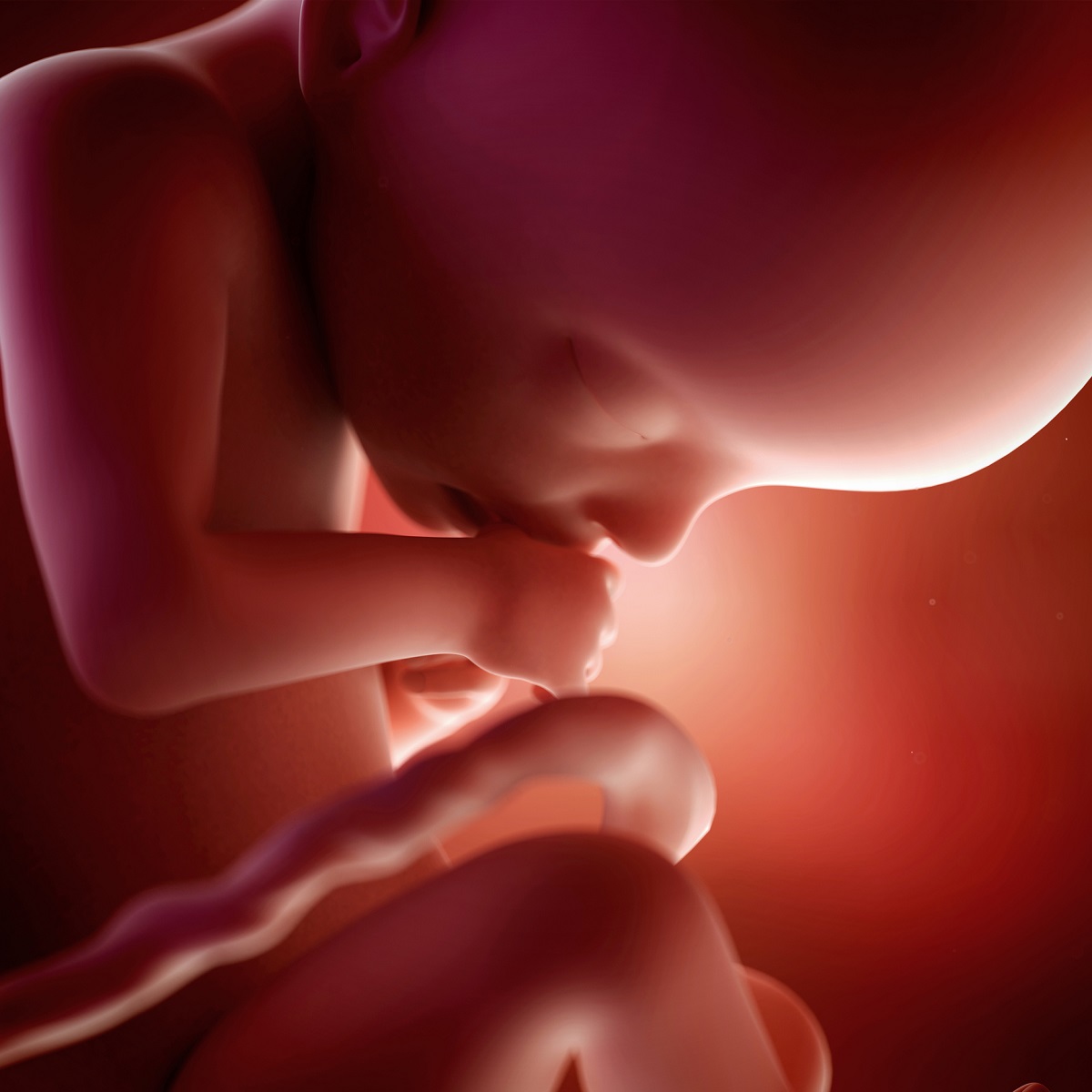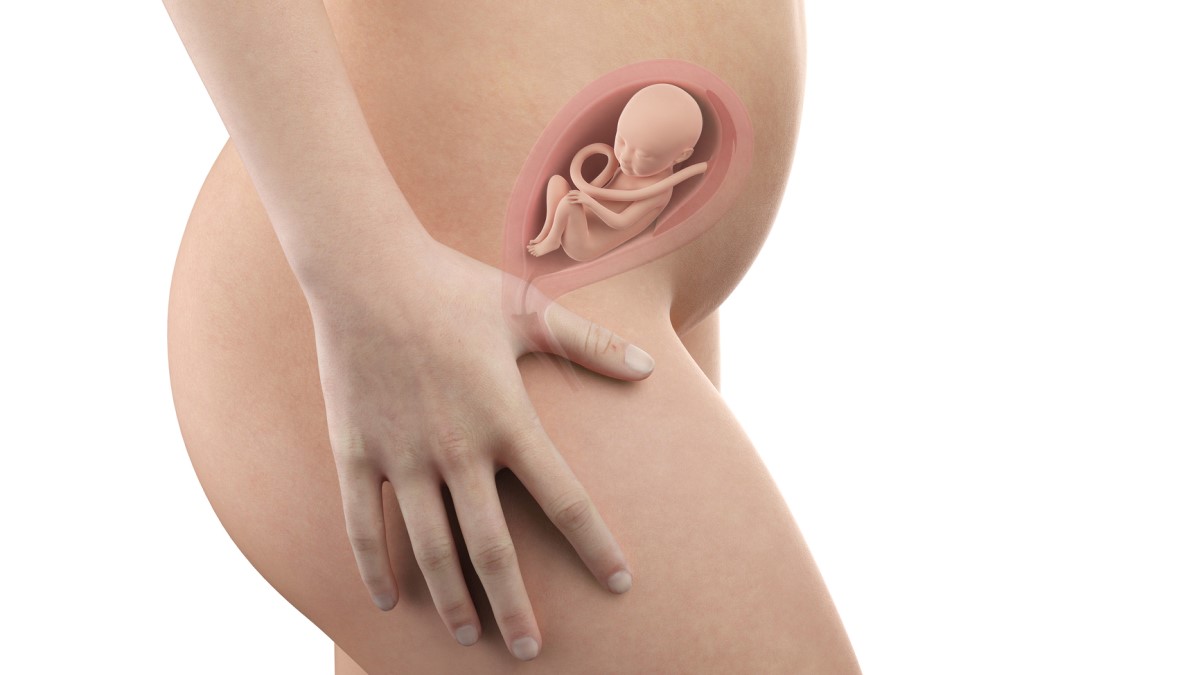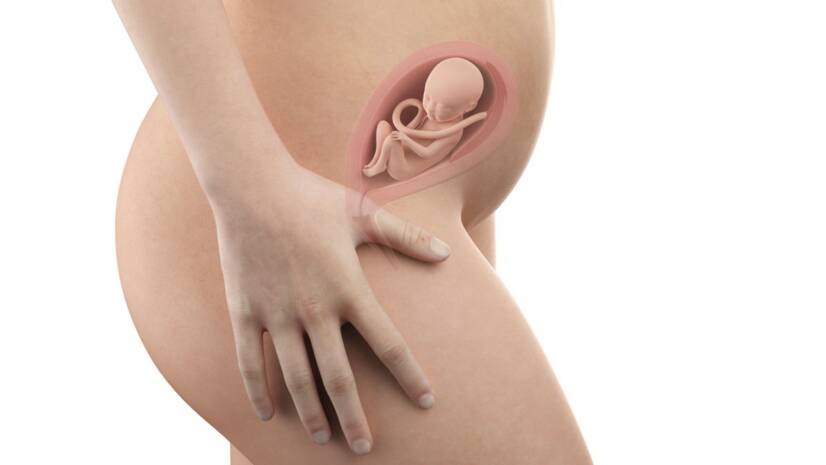- Pregnancy and Childcare - Jane Symons
- The Miraculous Journey to Life - Rainer Jonas
- medicalnewstoday.com - What is pregnancy like at 21 weeks?
- verywellfamily.com - Week 21 of pregnancy
- whattoexpect.com - 21 Weeks Pregnancy
- ehd.org - Prenatal summary
21 week of pregnancy: what is the baby doing in the tummy?

You are 21 weeks pregnant, you have just entered the second half of your pregnancy. Your baby is growing at a great speed. If he is not sleeping, he is already restless and always on the move at this time.
Article content
21 weeks pregnant, you're 5 months along and in the second half of your pregnancy.
You're 19 weeks from your due date.
The fetus measures about 26.5 centimeters and weighs about 360 grams.
There's plenty of room in the uterus for its acrobatic feats. It changes position frequently, moving, twisting and kicking. It can bounce off the uterine wall to exercise its muscles and nervous system.
He grabs his hands, face, feet and senses his surroundings. When he gets tired, he assumes a sleeping position and sleeps.
He sleeps for approximately 12 to 14 hours.

How is your baby developing in your tummy?
As your baby grows and matures, you can feel his movements more and more.
His muscle mass increases and his strength grows too.
His hearing is well developed. He responds to environmental sounds. He begins to sense light and dark. When you talk to him and stroke his tummy, he feels your touch through the uterine wall. He lets you know he's kicking.
The baby swallows the amniotic fluid, which enters the digestive system. The digestive system processes it. The baby's digestive system continues to develop and mature. Some of the amniotic fluid is expelled by the kidneys.
By drinking the amniotic fluid, the fetus gets sugar and other nutrition needed for its growth and development.
The pancreas begins to produce an enzyme that breaks down the food.
The small intestine grows. It processes all the nutrients obtained from the amniotic fluid that the fetus ingests.
The liver has already produced most of the red blood cells.
Now the bone marrow is also involved in the production of red blood cells, taking over most of the production of this blood component by the 24th week of pregnancy.
The eyelids, which have been closed and glued shut since about the 11th week of pregnancy, gradually begin to detach.
The brain is developing rapidly. It needs sufficient nutrients from the placenta to develop.
The arms and legs are reasonably long.
Cartilage begins to harden and turn to bone. The baby's skeleton begins to stiffen.
Hair and eyebrows are growing.
Taste buds begin to grow in the oral cavity of the tongue. The fetus tastes the amniotic fluid, which is sweet.
The fetus is still without fat reserves. From this point on, it begins to store fat reserves in the subcutaneous tissue.
The fingernails are developed, they are just too soft.
The immune system develops. The body begins to produce white blood cells, which are needed for the immune system. The fetus receives some of its antibodies from the mother through the umbilical cord.
The placenta supplies the baby with all the nutrients needed for its healthy development.
The fetus is considered viable from the 21st week of pregnancy. Life outside the womb becomes possible.
How does a woman feel at 21 weeks of pregnancy?
The uterus is enlarging and the bottom of the uterus extends beyond the level of the navel.
Most women can already feel the movements, but some may start to notice them later, but no later than the 22nd week of pregnancy.
Why can't I feel fetal movements yet?
Late fetal movements can occur if the placenta is deposited on the front side of the uterus. This prevents the perception of movements because of the thicker layer of tissue on the outside of the abdomen. It can also happen in overweight women.

Pelvic and joint pain. The joints and ligaments of the pelvis will gradually begin to relax. The pelvis will widen due to the hormone relaxin, which helps to make the pelvis more flexible and makes childbirth easier.
Varicose veins and leg cramps often manifest as painful cramps, especially in the calf area. They are probably caused by calcium and magnesium deficiency, tired muscles, increased weight and pressure of the uterus on blood vessels and nerves.
Bleeding gums are common after oral hygiene. The problem of bleeding gums is caused by increased blood supply to the mucous membranes.
A small number of women experience a sudden, sharp pain in the ligaments of the abdomen, groin or small pelvis. It lasts only a few seconds and then subsides on its own. It occurs especially after a change of position, from sitting to standing or from lying down to sitting.
Stretch marks may start to form on the abdomen, buttocks, flanks, thighs and even on the breasts in the form of red, pink or reddish-brown streaks. They are caused by stretching of the skin and tearing of the tissue under the skin. They are the result of rapid weight gain. Stretch marks fade over time but leave traces in the form of light streaks.
Mood swings and occasional morning sickness can cause hormone fluctuations. In this week, hormone fluctuations are common.
Back pain is related to the sudden change in weight and carrying a pregnant belly. Your ligaments are loosening, your belly is growing more and more and the weight is increasing. These factors affect your spine and may manifest themselves in pain.
Heartburn and indigestion is a common annoyance in pregnancy especially in the second and third trimesters. It often manifests itself after meals, more at night or when you lie down to sleep. It can cause chest pain, behind the rib cage, burning in the chest, and a bad and sour taste in the mouth. These symptoms can last for several minutes to hours.
What causes heartburn?
Your body undergoes major changes during pregnancy. There is increased production of the hormone progesterone, which causes slower digestion of food in the stomach. There is also increased levels of relaxin, which relaxes the smooth muscles of the body.
The relaxation of the smooth muscles also relaxes the sphincter of the oesophagus. Acid passes into the oesophagus and heartburn occurs. Another cause is an enlarging abdomen which puts pressure on the stomach. This also leads to a feeling of heartburn.
You can read more about heartburn in our article.
Bloating and flatulence are common accompaniments throughout pregnancy.
During pregnancy, due to the influence of hormones and (specifically the hormone relaxin) the ligaments relax, allowing for an easier vaginal delivery.
This hormone also has the effect of loosening the ligaments in the feet, which can lead to flat feet. It is this loosening of the ligaments that causes some women to increase the size of their feet by up to one size. Weight gain and weight gain also puts more strain on the feet and especially the arch of the foot.
Swelling of the feet is common, occurring particularly in the ankle area. Swelling is usually caused by increased blood flow and pregnancy hormones.
If the swelling increases and does not subside, inform your gynaecologist. It may be one of the symptoms of pre-eclampsia.
The risk of developing a urinary tract infection in pregnancy is increased. It is manifested by frequent urination, burning during and after urination, and discomfort in the genital area. In this case, it is necessary to see a doctor. The doctor will prescribe gentle medication to cure the inflammation for you and your baby.
What can you notice?
Tighter nails, thick and shiny hair.
Morning sickness and the feeling of vomiting have subsided and rarely occur.

Some women are troubled by the feeling of a stuffy nose or a pregnancy cold, which can affect mood. This is due to pregnancy hormones, increased blood supply to the mucous membranes. After the birth of the baby, these feelings subside within 10 days.
Forgetfulness. Do you feel like you're forgetting, have brain fog and find it harder to think?
It's called pregnancy brain.
It's a common phenomenon in pregnancy. You forget where you put your keys, you don't know where you left your purse, your wallet. Pregnancy affects a woman's body through huge changes - hormonal, physical and mental.
Some women experience mood changes, more feelings of anxiety, depression or bad moods that are similar to premenstrual syndrome.
Sleep deprivation leads to sleep deprivation, which is common in pregnancy. It persists even after childbirth. It arises because of preparation for the baby's arrival and after birth because of the baby's adjustment to his or her sleep pattern.
Sleep deprivation can negatively affect your mood in pregnancy and cause foggy thinking.
Stress also takes a toll on your brain. You may not even realise it. You're preparing for the arrival of a new family member, the responsibilities you have towards them and the fear of parenthood, even though you're looking forward to having a baby.
Skin changes. Increased blood circulation makes your skin appear pinker and more radiant. By retaining fluid in the body, fine lines may even smooth out and your skin takes on a more youthful appearance.
Dark spots on the face, acne, skin sensitivity and itchiness, red veins on the face may also appear.
What tests are you expecting at 21 weeks?
You will visit the clinic every 4 weeks in the second trimester.
Your blood pressure will be taken in the antenatal clinic. The urine sample you brought in will be tested for protein in the urine. You will be weighed and your weight will be recorded on your pregnancy chart.
High blood pressure and protein in the urine are indicative of pre-eclampsia.
If you have not had a consultation in the previous week, you will have a large ultrasound scan called a morphological ultrasound this week. The morphological ultrasound will examine the fetus in detail and pick up any abnormalities in development.

The table below shows the approximate measurements of the fetus at 21 weeks as measured by the sonographer
| Total length | Weight | HC Head circumference | BPD Transverse head diameter | AC Abdominal circumference | FL Femur length |
| 26.7 cm | 360 g | 184.5 mm | 51.7 mm | 158,7 mm | 34,1 mm |
For more information on fetal size, see the article:
Ultrasound in pregnancy: fetal size, what is fetal biometry?
What can we recommend?
- Eat a varied and healthy diet with sufficient vitamin intake.
- Include fresh vegetables, fruits, nuts and a diet containing calcium in your diet.
- Limit fish in your diet to no more than two portions of fish per week.
- Avoid unpasteurised soft cheeses, raw or undercooked foods, raw eggs.
- Take vitamins designed for pregnant women. They are precisely made according to the body's requirements for healthy fetal development.
- Avoid alcohol, smoking, toxic substances.
- If you have heartburn, skip spicy foods, don't overeat, avoid high-fat foods and limit meat, citrus fruits, tomatoes, chocolate, caffeine. Eat smaller portions, drink plenty of fluids, don't sleep after meals.
- Remember to drink enough.
- Foot problems. Wear comfortable shoes, avoid standing for long periods and walking barefoot. Rest with your feet stretched out, wear orthotics in your shoes to support the arch of your foot.
- Regular walks in the fresh air will help you feel better and get fitter.
- Exercise for pregnant women, such as pregnancy yoga, is also good for learning breathing techniques. You can use breathing techniques during labour. Exercise has a positive effect on your body and muscles. With proper exercise, you can avoid back pain, lack of energy and even a bad mood.
- Exercises to stretch your legs will help prevent unwanted cramps in your calves.
- Kegel exercises to strengthen the pelvic floor can be done at any time of the day.
- Do not forget to get enough sleep and rest. When resting, put your feet on a pillow to rest.
- Avoid lying on your back and prefer to lie on your side. The pressure of the uterus lying on your back presses on the inferior vena cava and will reduce blood flow to the legs.
- Skin care. Regularly lubricate the skin of the body to reduce the appearance of stretch marks.
- Increase your dietary intake of iron, which is needed to supply the body with oxygen for you and the fetus. When severe anemia does not supply the fetus with enough oxygen, its growth is dangerously stunted.
Symptoms of anemia are weakness, excessive fatigue, pallor, dizziness and constricted breathing.
For heartburn in pregnancy, you can take medications suitable only for pregnant women.
It is not recommended to take baking soda to relieve the feeling of heartburn in pregnancy. It is not recommended to take medicines containing aspirin.
What to watch out for?
- Vaginal bleeding
- Outflow of amniotic fluid
- Dizziness and feeling faint
- Pressure on the uterine lining
- Pain in the pelvic area or neck
Vaginal bleeding may occur after sex, after a vaginal examination. It may be a sign of infection, a low-lying placenta in the uterus, premature opening of the cervix, impending premature birth, or separation of the placenta from the uterus.
If you notice bleeding, see your doctor or the nearest hospital immediately.
For more information about the other weeks of pregnancy, see the summary article .
More interesting articles on pregnancy:
- What is the placenta, when does it form and what is its function during pregnancy?
- How to recognize pre-eclampsia and its symptoms in pregnancy?
- What is pre-eclampsia? What are the risks of pre-eclampsia?
- How much weight to gain during pregnancy? What does it depend on and what to watch out for?
- Discharge in pregnancy. What is considered normal discharge? And how does infection manifest itself?
- You are pregnant and you are troubled by pain in the lower abdomen?
- In pregnancy, beware of anemia. What are its causes, symptoms?
Gallery




Interesting resources
Related










